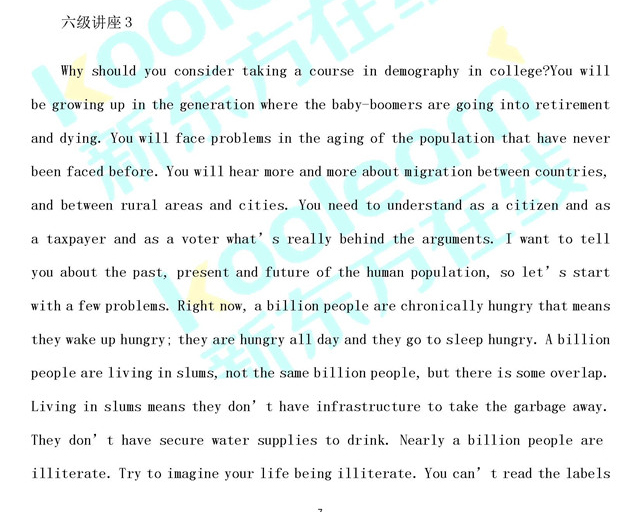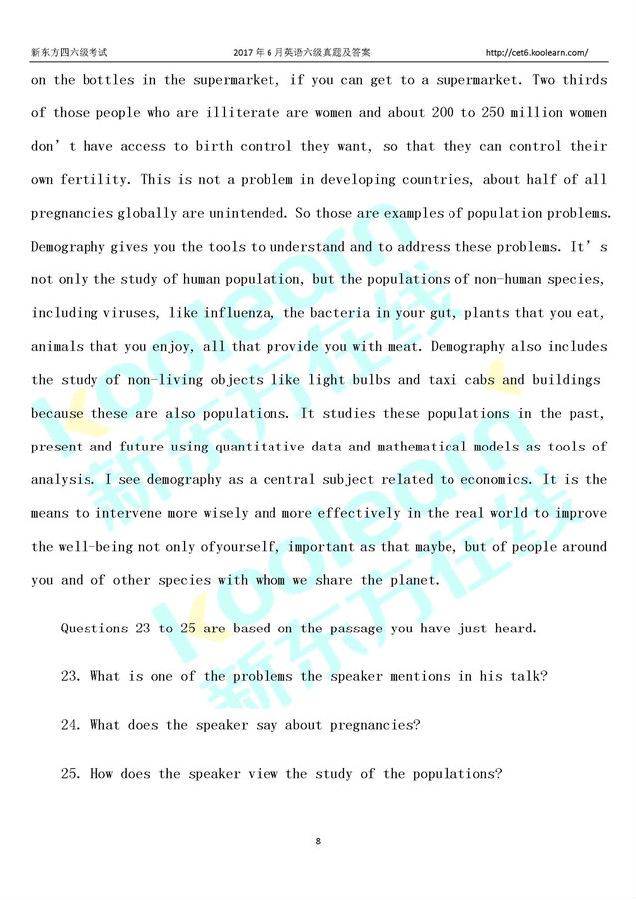六级课程经典
零基础速升HOT
去试听
六级1对1
定制化
寒假跟学攻略
0元
六级核心词带背
9.9
六级阅读 冲刺200+大招
0元
六级真题+答案
免费
听力提升 VOA&BBC原声
热门
132个保研故事免费
考研真题大全
免费
考研特训营
免费
27考研书单
推荐版
考研AI择校
智能
新东方在线考后发布2017年6月英语六级真题及答案,同时对真题进行直播解析,同学们可以提前收藏关注。点击【→→真题答案专题】查看更多2017年6月英语六级听力真题及答案、英语六级作文真题答案、英语六级阅读真题答案、英语六级翻译真题答案!祝考生同学们都能刷得高分~
2017年6月英语四六级真题及答案 | ||
作文 | ||
听力 | ||
阅读 | ||
翻译 | ||
讲座1
Well my current research is really about consumer behavior. So recently I've looked at young people's drinking and it's obviously a major concern to Government at the moment.
I've also looked at how older people are represented in the media; again, it's of major current interest with older people becoming a much larger proportion of UK and indeed world society.
I'm also interested in how consumers operate online, and how that online behavior might be different from how they operate offline when they go to the shops.
Well, I think that the important thing here is to actually understand what's happening from the consumer's perspective. One of the things that businesses and indeed Government organizations often fail to do is to really see what is happening from the consumer's perspective.
For example, in the case of young people's drinking, one of the things that I've identified is that drinking for people say between the ages of 18 and 24 is all about the social activity.
A lot of the Government advertising has been about individual responsibility, but actually understanding that drinking is very much about the social activity and finding ways to help young people get home safely and not end up in hospital is one of the things that we've tried to present there.
The key thing about consumer behavior is that it's very much about how consumers change. Markets always change faster than marketing; so we have to look at what consumers are doing.
Currently I teach consumer behavior to undergraduates in their second year and we look at all kinds of things in consumer behavior and particularly how consumers are presented in advertising.
So they get involved by looking at advertising and really critically assessing the consumer behavior aspects of it and getting involved sometimes doing primary research.
For example, last year my students spent a week looking at their own purchasing and analyzed it in detail from shopping to the relationship that they have with their retail banks and their mobile phone providers. I think they found it very useful and it also helped them identify just what kind of budgets they had too. The fact of the matter is that there's a whole range of interesting research out there and I think as the years go on, there's going to be much more for us to consider and certainly much more for students to become involved in.
16. What is the speaker currently doing?
17. What has the speaker found about young people's drinking?
18. What does the speaker say that his students did last year?
讲座2
Sweden was the first European country to print and use paper money, but it may soon do away with physical currencies.
Banks can save a lot of money and avoid regulatory headaches by moving to a cash-free system, and they can also avoid bank robberies, theft, and dirty money.
Claer Barrett, the editor of Financial Times Money, says the Western world is headed toward a world without physical currency.
"Andy Holder — the chief eco|nomist at The Bank of England — suggested that the UK move towards a government-backed digital currency. But does a cashless society really make good economic sense?
"The fact that cash is being drawn out of society, is less a feature of our everyday lives, and the ease of electronic payments — is this actually making us spend more money without realizing it?"
Barrett wanted to find out if the absence of physical currency does indeed cause a person to spend more, so she decided to conduct an experiment a few months ago.
She decided that she was going to try to just use cash for two weeks to make all of her essential purchases and see what that would do to her spending. She found she did spend a lot less money because it is incredibly hard to predict how much cash one is going to need — she was forever drawing money out of cash points. Months later, she was still finding cash stuffed in her trouser pockets and the pockets of her handbags.
During the experiment, Barrett took a train ride. On the way, there was an announcement that the restaurant car was not currently accepting credit cards. The train cars were filled with groans because many of the passengers were traveling without cash.
"It underlines just how much things have changed in the last generation," Barrett says. "My parents, when they were younger, used to budget by putting money into envelopes — they'd get paid and they'd immediately separate the cash into piles and put them in envelopes, so they knew what they had to spend week by week. It was a very effective way for them to keep track of their spending. Nowadays, we're all on credit cards, we're doing online purchases, and money is kind of becoming a less physical and more imaginary type of thing that we can't get our hands around."
Q19. What do we learn about Sweden?
Q20. What did Claer Barrett want to find out with her experiment?
Q21. What did Claer Barrett find on her train ride?
Q22. How did people of the last generation budget their spending?


新东方英语六级好课免费听↓↓↓
| 课程名称 | 课程亮点 | 试听 |
| 【小班课】英语四六级零基础无忧计划 | 1V1答疑 | 免费试听 |
| 【零基础】四六级全科专项突破 | 单项全面进阶 | 免费试听 |
| 【阅读】四六级阅读高分技巧 | 双师精讲阅读 | 免费试听 |
| 【写作】四六级写作万能模板 | 双师精讲写作 | 免费试听 |
| 【听力】四六级听力高分技巧 | 双师精讲听力 | 免费试听 |
| 【寒假班】英语四六级全程班 | 考前冲分快准狠 | 免费试听 |
| 了解更多四六级课程 | ||
本文关键字: 英语六级听力真题

 资料下载
资料下载
2022年大选英语四级词汇完整带音标
发布时间:2020-04-15关注四六级小助手服务号
回复【过级词汇】获取
刘一男六级核心词汇完整版
发布时间:2020-04-15关注四六级小助手服务号
回复【过级词汇】获取
新东方英语口语终极教程word版
发布时间:2020-04-15关注四六级小助手服务号
回复【口语提升】获取
大学英语六级:练口语及单词lesson1-9
发布时间:2020-04-15关注四六级小助手服务号
回复【口语提升】获取
新东方在线[四六级王牌团队]典藏笔记
发布时间:2019-10-25关注四六级小助手服务号
回复【典藏笔记】获取
英语六级过级备考资料:经验+计划+语法
发布时间:2019-10-25关注四六级小助手服务号
回复【过级经验】获取
大学英语六级阅读解题经验技巧
发布时间:2019-10-25关注四六级小助手服务号
回复【阅读礼包】获取
英语四级写作诵读193经典句
发布时间:2019-10-25关注四六级小助手服务号
回复【写作指导】获取
英语六级听力讲义汇总资料
发布时间:2019-10-25关注四六级小助手服务号
回复【听力礼包】获取
英语六级口语考试练习小积累
发布时间:2019-10-25关注四六级小助手服务号
回复【口语提升】获取
大学英语六级核心高频词汇
发布时间:2019-10-25关注四六级小助手服务号
回复【过级词汇】获取

关注四六级小助手服务号回复【典藏笔记】获取
关注四六级小助手服务号,
获取学习资料

 推荐阅读
推荐阅读
2023年12月英语六级真题及答案(第三套)包括听力和笔试部分,笔试部分为图片版,支持免费下载。
来源 : 新东方在线 2024-02-29 10:07:59 关键字 : 2023年12月六级真题
2023年12月英语六级真题及答案(第二套)包括听力和笔试部分,笔试部分为图片版,支持免费下载。
来源 : 新东方在线 2024-02-29 10:07:04 关键字 : 2023年12月六级真题
2023年12月英语六级真题及答案(第一套)包括听力和笔试部分,笔试部分为图片版,支持免费下载。
来源 : 新东方在线 2024-02-29 10:00:32 关键字 : 2023年12月六级真题
2023年12月英语六级考试已经在12月16日下午结束了,相信同学们想对下六级答案,估算下自己的六级成绩。新东方六级老师已经第一时间整理
来源 : 新东方在线 2023-12-16 17:14:09 关键字 : 六级听力答案,六级听力真题
2023年12月英语六级考试已经在12月16日下午结束了,相信同学们想对下六级答案,估算下自己的六级成绩。新东方六级老师已经第
来源 : 新东方在线 2023-12-16 17:26:00 关键字 : 六级听力原文,六级听力答案


 专项提升公开课
专项提升公开课
专为基础薄弱打造 重磅升级
价格 : ¥279
限报人数:1000人
1v1小灶课
价格 : ¥1799
限报人数:1000人
报名必得3大词汇资料包
价格 : ¥0
限报人数:10000人
随领随学 告别‘小聋瞎’
价格 : ¥0
限报人数:1000人
 资料下载
资料下载
关注四六级小助手服务号
回复【过级词汇】获取
关注四六级小助手服务号
回复【过级词汇】获取
关注四六级小助手服务号
回复【口语提升】获取
关注四六级小助手服务号
回复【口语提升】获取
关注四六级小助手服务号
回复【典藏笔记】获取
关注四六级小助手服务号
回复【过级经验】获取
关注四六级小助手服务号
回复【阅读礼包】获取
关注四六级小助手服务号
回复【写作指导】获取
关注四六级小助手服务号
回复【听力礼包】获取
关注四六级小助手服务号
回复【口语提升】获取
关注四六级小助手服务号
回复【过级词汇】获取

 阅读排行榜
阅读排行榜
 相关内容
相关内容